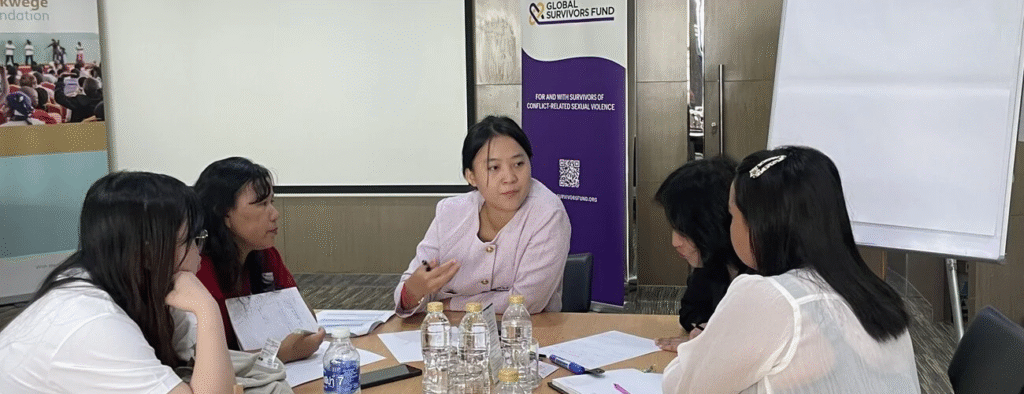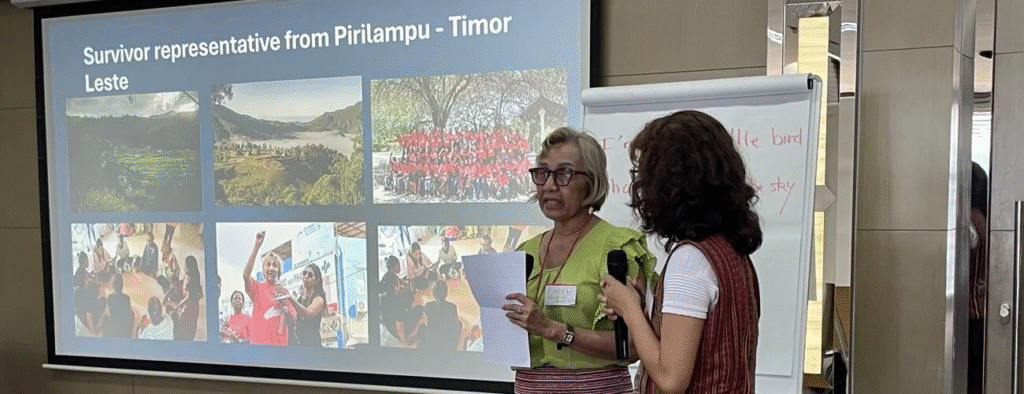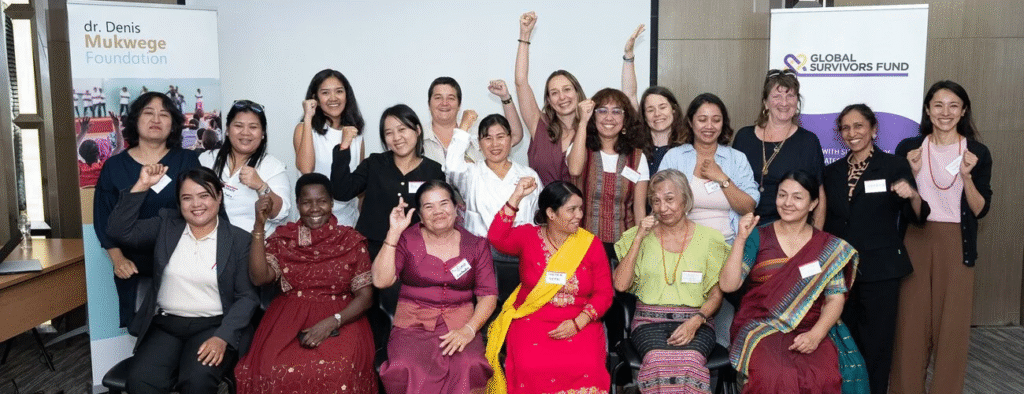To mark the International Day for the Elimination of Sexual Violence in Conflict, the Mukwege Foundation and the Global Survivors Fund (GSF) co-hosted the first-ever Asian Regional Survivors Exchange in Bangkok on 19 June. The event brought together survivors of conflict-related sexual violence from four countries across Asia, along with partners and allies.
Over two days, survivors and partner organisations from Nepal, Myanmar (living in Bangladesh and Thailand), Timor-Leste, and Cambodia came together to share their experiences, reflect on lessons learned from their work, and explore joint priorities for advocacy.
In a region where survivor-centred approaches and survivor-led movements have been limited, the meeting represented a crucial step towards building regional cooperation and survivor-led action in Asia
Sylvia Acan, a founding member of the Global Network of Victims and Survivors to End Wartime Sexual Violence (SEMA), travelled from Uganda to demonstrate the impact of survivor-led initiatives. The network, established by the Mukwege Foundation in 2017, brings together survivors from 27 countries to mobilise and advocate for justice and change.
“Survivor-led advocacy is not only important — it is essential in the work against conflict-related sexual violence. Community trust is significantly higher when survivor activists are at the centre of programming,” she told the audience.


Survivors and members of civil society organisations from Myanmar meet together. Thailand, June 2025. Hitomi Fujimoto.

Day 1: What happens when survivors lead?
Each participant brought a unique voice and vision shaped by years of activism. Devi Khadka, founder of Nepal’s Aparajit Foundation, shared how their movement began with one voice and grew into a network of over 1,000 survivors committed to survivor-led change under the slogan: “Let’s speak and fight for ourselves, together.”
Two decades after the end of the civil war in Nepal, survivors from Aparajit are collecting testimonies from thousands of victims of conflict-related sexual violence to be included in the Nepalese Truth and Reconciliation Commission.
The first achievement of this project is that we were able to accept ourselves. Earlier, when the incident happened, it was very difficult. I thought I was the only one who was suffering…now I am able to love myself. I have realised that there are people who have experienced different types of violence, but we are together in this.
Survivor from Nepal on her experience in a survivor-led project.
Others also shared their experiences:
- From the Rohingya refugee camps in Cox’s Bazar, members of the Usila survivor network shared how they support one another through peer meetings, mental health sessions and creative expression, with the aim of restoring peace and dignity while living in displacement;
- For the first time, members of Survivors United for Rights and Justice (SURJ), a newly- established network of Myanmar survivors living in exile in Mae Sot, Thailand, spoke out about the sexual violence they suffered as political prisoners;
- A representative of the Karenni National Women’s Organisation (KNWO) in Mae Hong Son, Thailand, highlighted the vital role of mobile safe houses for refugee survivors from Myanmar, legal support and women-led documentation initiatives;
- The leader of the Pirilampu Network in Timor-Leste shared how the network, supported by Asia Justice and Rights (AJAR) and Asosiasaun Chega! Ba Ita (ACBIT), offers hope to survivors decades after the Indonesian occupation.


A survivor from Timor-Leste speaks during the event. Thailand, June 2025. Hitomi Fujimoto.

Later in the day, survivors involved in GSF’s interim reparative measures projects in Timor-Leste, Nepal and Cambodia exchanged stories of their experiences.
They highlighted key achievements such as successfully reaching other survivors in their countries, and participants receiving medical, psychological and financial reparative measures, while also sharing challenges like reluctance among survivors to come forward and the lack of state recognition.


Survivors and CSO staff from Myanmar talking during the event Thailand, June 2025. Hitomi Fujimoto

Day 2: Reflections from survivors and sharing experiences.
Survivors from each country worked in groups to identify the most pressing needs for their communities and how these could be addressed through joint action.
Four common priorities emerged, reflecting shared demands among survivors across borders:
- Provide safe spaces for survivors to connect, heal, support each other and work together;
- Facilitate access to holistic support for survivors, including medical, psychological, legal and socio-economic through assistance programmes or reparations, as well as emergency support;
- Raise awareness about the causes and consequences of conflict-related sexual violence on survivors in order to combat stigmatisation and ensure their safety;
- Advocate for accountability and justice, including reparations, at all levels (local, national, regional and international).
The exchange closed with a powerful performance of the SEMA song ‘Little Bird’ by survivors, and a commitment to stay connected and support each other’s advocacy efforts.
The Mukwege Foundation and GSF remain committed to supporting survivor-led initiatives in the region — from expanding the SEMA network to co-developing future regional advocacy efforts.
Read the full joint statement from survivors in Burmese, English, Khamer, Nepalese, and Tetun.